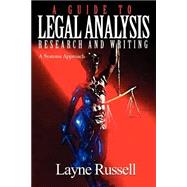| Preface | xi | ||||
| Legal Research and Writing Fundamentals | xi | ||||
| Overview | xi | ||||
| Outstanding Features | xiii | ||||
| Competition | xiii | ||||
| Content | xiv | ||||
| Organization: ``What is Law?'' | xiv | ||||
| ``Developing the Issue''-The Concept of Analytical Thinking | xiv | ||||
| The Substantive Answer to the Relevant Question | xv | ||||
| Legal Research | xv | ||||
| When to End Legal Research | xvi | ||||
| Legal Writing | xvi | ||||
| Ancillary Materials | xvi | ||||
| CALR | xvi | ||||
| Introduction | xvii | ||||
| How Can I, a Non-Lawyer, Ever Begin to Understand the Law? | xvii | ||||
| How will I understand the law when the words are confusing and have different meanings? | xviii | ||||
| PART ONE---LEGAL ANALYSIS | 1 | (36) | |||
|
3 | (9) | |||
|
3 | (1) | |||
|
3 | (2) | |||
|
5 | (1) | |||
|
6 | (1) | |||
|
6 | (1) | |||
|
7 | (1) | |||
|
7 | (1) | |||
|
8 | (1) | |||
|
9 | (3) | |||
|
12 | (4) | |||
|
12 | (1) | |||
|
12 | (4) | |||
|
16 | (8) | |||
|
16 | (1) | |||
|
16 | (1) | |||
|
16 | (1) | |||
|
16 | (1) | |||
|
16 | (1) | |||
|
16 | (1) | |||
|
17 | (1) | |||
|
17 | (1) | |||
|
17 | (1) | |||
|
17 | (1) | |||
|
17 | (1) | |||
|
18 | (1) | |||
|
18 | (6) | |||
|
19 | (5) | |||
|
24 | (11) | |||
|
24 | (1) | |||
|
24 | (1) | |||
|
25 | (1) | |||
|
25 | (1) | |||
|
26 | (1) | |||
|
26 | (1) | |||
|
27 | (1) | |||
|
27 | (5) | |||
|
32 | (3) | |||
|
35 | (2) | |||
| PART TWO---LEGAL RESEARCH | 37 | (54) | |||
|
39 | (12) | |||
|
39 | (1) | |||
|
40 | (1) | |||
|
41 | (1) | |||
|
42 | (1) | |||
|
43 | (1) | |||
|
44 | (1) | |||
|
44 | (4) | |||
|
48 | (1) | |||
|
48 | (1) | |||
|
49 | (2) | |||
|
51 | (10) | |||
|
51 | (4) | |||
|
55 | (2) | |||
|
57 | (4) | |||
|
61 | (15) | |||
|
61 | (1) | |||
|
61 | (1) | |||
|
62 | (1) | |||
|
63 | (1) | |||
|
64 | (1) | |||
|
65 | (1) | |||
|
66 | (1) | |||
|
67 | (1) | |||
|
68 | (1) | |||
|
69 | (1) | |||
|
70 | (3) | |||
|
73 | (3) | |||
|
76 | (12) | |||
|
76 | (1) | |||
|
76 | (2) | |||
|
78 | (1) | |||
|
78 | (1) | |||
|
79 | (9) | |||
|
88 | (3) | |||
|
89 | (2) | |||
| PART THREE---WRITING ABOUT LEGAL AUTHORITY | 91 | (20) | |||
|
93 | (1) | |||
|
94 | (3) | |||
|
97 | (12) | |||
|
97 | (2) | |||
|
99 | (1) | |||
|
99 | (1) | |||
|
100 | (1) | |||
|
101 | (1) | |||
|
101 | (1) | |||
|
102 | (1) | |||
|
103 | (1) | |||
|
103 | (2) | |||
|
105 | (1) | |||
|
106 | (3) | |||
|
109 | (2) | |||
|
109 | (2) | |||
| Conclusion | 111 | (2) | |||
| Appendix A | 113 | (18) | |||
| Appendix B---Bluebook | 131 | (4) | |||
| Appendix C | 135 | (2) | |||
| Appendix D | 137 | (40) | |||
| Appendix E---Defenses | 177 | (2) | |||
| Appendix F---Writing the Inner-Office Memorandum of Law | 179 | (26) | |||
| Appendix G---Analyzing what you Read (Analytical Reading) | 205 | (4) | |||
| Appendix H | 209 |








